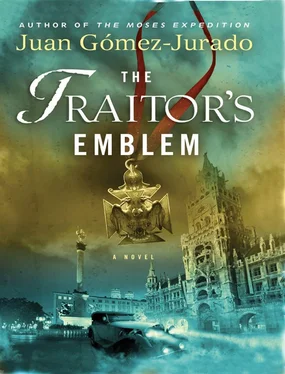Juan Gomez-Jurado - The Traitor's emblem
Здесь есть возможность читать онлайн «Juan Gomez-Jurado - The Traitor's emblem» весь текст электронной книги совершенно бесплатно (целиком полную версию без сокращений). В некоторых случаях можно слушать аудио, скачать через торрент в формате fb2 и присутствует краткое содержание. Жанр: Триллер, на английском языке. Описание произведения, (предисловие) а так же отзывы посетителей доступны на портале библиотеки ЛибКат.
- Название:The Traitor's emblem
- Автор:
- Жанр:
- Год:неизвестен
- ISBN:нет данных
- Рейтинг книги:4 / 5. Голосов: 1
-
Избранное:Добавить в избранное
- Отзывы:
-
Ваша оценка:
- 80
- 1
- 2
- 3
- 4
- 5
The Traitor's emblem: краткое содержание, описание и аннотация
Предлагаем к чтению аннотацию, описание, краткое содержание или предисловие (зависит от того, что написал сам автор книги «The Traitor's emblem»). Если вы не нашли необходимую информацию о книге — напишите в комментариях, мы постараемся отыскать её.
The Traitor's emblem — читать онлайн бесплатно полную книгу (весь текст) целиком
Ниже представлен текст книги, разбитый по страницам. Система сохранения места последней прочитанной страницы, позволяет с удобством читать онлайн бесплатно книгу «The Traitor's emblem», без необходимости каждый раз заново искать на чём Вы остановились. Поставьте закладку, и сможете в любой момент перейти на страницу, на которой закончили чтение.
Интервал:
Закладка:
“See? They really put a smile on your face!” said his friend, braying with laughter.
Alys was astonished to see this, and the Kodak almost slipped from her hands. She wanted to vomit. This drunk, just another one of the kind she had despised night after night for weeks, was so far from her image of the shy coal bearer that Alys couldn’t believe it was really Paul.
And yet it was.
Through the haze of alcohol, the young man suddenly recognized her and unsteadily got to his feet.
“Alys!”
The man who was with him turned to her and raised his glass.
“You know each other?”
“I thought I knew him,” said Alys coldly.
“Superb! Then you ought to know that your friend is the most successful banker in Isartor… We sell more shares than any of the other banks that have been popping up lately! I’m his proud accountant
… Come on, drink a toast with us.”
Alys felt a wave of scorn run through her body. She’d heard all about the new banks. Almost all of those set up in recent months had been established by young people, and a lot of student types came to the club every night to burn away their earnings on champagne and whores before the money lost its value completely.
“When my father told me you’d taken the money, I didn’t believe him. How wrong I was. Now I can see it’s the only thing you’re interested in,” she said, turning away.
“Alys, wait…” stammered the young man, embarrassed. He stumbled around the table and tried to grab her hand.
Alys turned and gave him a slap that rang out like a bell. Although Paul tried to save himself by clutching at the tablecloth, he toppled over and ended up on the floor amid a shower of broken bottles and the laughter of the three chorus girls.
“By the way,” Alys said as she walked off, “in that tuxedo you still look like a waiter.”
Paul used the chair to pull himself up, just in time to see Alys’s back disappearing into the crowd. His friend the accountant was now leading the girls to the dance floor. Suddenly an arm grabbed Paul firmly and guided him into the chair.
“Looks like you’ve rubbed her the wrong way, eh?”
The man who’d helped him seemed vaguely familiar.
“Who the hell are you?”
“I’m a friend of your father’s, Paul. Someone who right now is wondering whether you’re worthy of sharing his name.”
“What do you know about my father?”
The man pulled out a card and put it in the inside pocket of Paul’s tuxedo.
“Come see me when you’ve sobered up.”
25
Paul looked up from the card and contemplated the sign above the bookshop, still not understanding what he was doing there.
The shop was just a few steps from Marienplatz, in the tiny heart of Munich. This was where Schwabing’s butchers and hawkers gave way to watchmakers, milliners, and shops selling walking sticks. There was even a small cinema close to Keller’s establishment that was showing F.W. Murnau’s Nosferatu, more than a year after it had first come out. It was the afternoon, and they must have already been halfway through the second screening. Paul pictured the projectionist in his booth, changing the worn reels of film one by one. He felt sorry for him. He had slipped in to see that film-the first and only film he’d seen-in a cinema close to the boardinghouse, when the whole town had been talking about it. He hadn’t much liked the thinly veiled screen adaptation of Bram Stoker’s Dracula. For him, the true emotion of the story resided in its words and its silence, in the white that surrounded the black letters on the page. The cinematic version seemed rather too simple, like a jigsaw with only two pieces.
Paul entered the bookshop cautiously, but soon forgot his misgivings as he studied the volumes scrupulously arranged on the floor-to-ceiling bookcases and on the large tables beside the window. There was no counter in sight.
He was leafing through a first edition of Death in Venice when he heard a voice behind him.
“Thomas Mann’s not a bad choice, but I’m sure you’ve read that one already.”
Paul turned. There was Keller, smiling at him. His hair was completely white, he sported an old-fashioned goatee, and from time to time he would scratch his large ears, drawing even more attention to them. Paul felt that he knew this man, though he was unable to say how.
“Yes, I’ve read it, but in a hurry. I was lent it by someone staying in the boardinghouse where I live. Books don’t normally stay in my hands for long, however much I want to reread them.”
“Ah. But don’t reread, Paul, you’re too young, and people who reread tend to fill themselves with inadequate wisdom too quickly. For now you should read everything you can, as wide a variety as possible. Only when you get to my age will you find that rereading isn’t a waste of time.”
Paul took another good look at him. Keller was well past fifty, though his back was straight as a rod and his body was trim in an old-fashioned three-piece suit. His white hair gave him a venerable appearance, though Paul suspected that it might have been dyed. Suddenly he realized where he’d seen this man before.
“You were at Jurgen’s birthday party, four years ago.”
“You have a good memory, Paul.”
“You told me to leave as soon as I could… that she was waiting outside,” Paul said sadly.
“I remember you rescuing the girl with absolute clarity, right in the middle of the ballroom. In my day I had my moments too… and my low points, although I never made as big a mistake as the one I saw you making yesterday, Paul.”
“Don’t remind me. How the hell was I supposed to know she was there? It’s been two years since I last saw her!”
“Well, then, I think the right question here is: What the hell were you doing getting yourself as drunk as a sailor?”
Paul shuffled his feet uncomfortably. He was embarrassed to be discussing these things with a complete stranger, but at the same time he experienced a peculiar calm in the bookseller’s company.
“Anyway,” Keller went on, “I don’t want to torture you, as the bags under your eyes and your pale face tell me you’ve tortured yourself enough already.”
“You said you wanted to talk to me about my father,” Paul said anxiously.
“No, that wasn’t what I said. I said you should come and see me.”
“Then why?”
This time it was Keller’s turn to remain silent. He led Paul to the window and pointed over to the church of St. Michael, just across from the bookshop. A bronze plaque detailing the family tree of the Wittelsbach dynasty stood above the statue of the archangel who gave his name to the building. In the afternoon sun, the statue’s shadows were long and threatening.
“Look… three and a half centuries of splendor. And that’s just a short prologue. In 1825, Ludwig the First decided to transform our city into the new Athens. Full of light, space, and harmony in its avenues and boulevards. Now look a little lower, Paul.”
At the door to the church, beggars had gathered, lining up to receive the soup that the parish distributed at sunset. The queue had only just started to form, and already it reached farther than Paul could see from the shop window. He wasn’t surprised to spot war veterans, still in their grubby uniforms, which had been forbidden for almost five years now. Nor was he shocked by the appearance of the tramps, whose faces had been imprinted by poverty and drink. What did surprise him was seeing dozens of adult men dressed in worn suits but with their shirts perfectly ironed, all of them with no sign of an overcoat in spite of the strong wind that June evening.
The overcoat of a family man who has to go out every day to find bread for his children-that’s always one of the last things to be pawned, thought Paul, nervously moving his hands in his own coat pockets. He’d bought the coat secondhand, surprised to find such good-quality fabric for the price of an average-size cheese.
Читать дальшеИнтервал:
Закладка:
Похожие книги на «The Traitor's emblem»
Представляем Вашему вниманию похожие книги на «The Traitor's emblem» списком для выбора. Мы отобрали схожую по названию и смыслу литературу в надежде предоставить читателям больше вариантов отыскать новые, интересные, ещё непрочитанные произведения.
Обсуждение, отзывы о книге «The Traitor's emblem» и просто собственные мнения читателей. Оставьте ваши комментарии, напишите, что Вы думаете о произведении, его смысле или главных героях. Укажите что конкретно понравилось, а что нет, и почему Вы так считаете.












